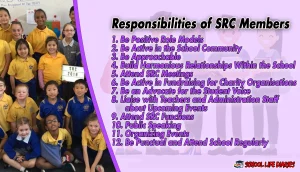Are you curious about the role of students in shaping their school community? Do you want to learn more about a significant avenue for student participation and leadership? Look no further than the Student Representative Council (SRC). The Student Representative Council is an influential body that provides students with a platform to voice their opinions, advocate for their needs, and contribute to decision-making processes within their school.
In this blog post, we will delve into the world of the Student Representative Council, exploring its purpose, responsibilities, and the valuable role it plays in empowering students to make a difference. Join us as we uncover the essence of the Student Representative Council and the impact it has on shaping vibrant and inclusive school communities.
What Is The Purpose of The Student Representative Council?
1. Amplifying Student Voice:
The student representative council serves as a platform for students to express their opinions, concerns, and ideas. It provides a formal structure for students to share their perspectives on various school-related matters.
2. Advocating for Student Needs:
The SRC acts as a collective voice for students, advocating for their rights, welfare, and interests. It represents the student body in discussions and negotiations with school administration and staff.
3. Fostering Student Leadership:
The SRC provides opportunities for students to develop leadership skills and take on responsible roles. It encourages students to organize events, initiate projects, and contribute to the overall development of the school community.
4. Promoting Student Engagement:
The SRC aims to engage students in school activities, programs, and decision-making processes. It encourages active participation and involvement, fostering a sense of belonging and ownership among students.
5. Enhancing School Climate and Culture:
The SRC plays a vital role in creating a positive and inclusive school climate. It works towards promoting respect, diversity, and collaboration, fostering a sense of unity and community spirit.
6. Bridging Communication Gap:
The SRC acts as a bridge between students, teachers, administration, and other stakeholders. It facilitates effective communication, ensuring that student concerns and feedback are conveyed and addressed.
7. Encouraging Civic Responsibility:
The SRC cultivates a sense of civic responsibility among students, encouraging active citizenship. It promotes social awareness, community engagement, and responsible decision-making.
8. Developing Life Skills:
The SRC provides opportunities for students to develop essential life skills, such as public speaking, teamwork, and problem-solving. It nurtures personal growth and equips students with skills that are valuable beyond their school years.
Who Can Be Part of the SRC?
The Student Representative Council (SRC) is a platform that encourages student engagement, leadership, and representation. It strives to include diverse voices and perspectives from the student body.
Any student enrolled in the school can be part of the SRC, provided they meet certain criteria and follow established guidelines. Here are some common considerations for SRC membership:
1. Open to All Students:
The SRC is inclusive and open to all students within the school, regardless of age, gender, background, or academic performance.
2. Voluntary Participation:
Students who are interested in being part of the SRC can voluntarily express their willingness to join.
3. Election or Nomination Process:
Depending on the school’s structure, SRC members may be elected by the student body through a democratic voting process or nominated by their peers or teachers.
4. Term of Office:
SRC members typically serve for a specific term, such as a school year, to ensure rotation and allow more students to participate over time.
5. Commitment and Dedication:
Students interested in being part of the SRC are expected to demonstrate commitment, responsibility, and a genuine interest in representing their fellow students.
6. Leadership Potential:
While prior leadership experience is not always a requirement, students with leadership potential and a willingness to take on responsibilities are often encouraged to join the SRC.
7. Good Academic Standing:
Some schools may have academic requirements, such as maintaining a certain GPA or meeting specific criteria, to ensure that SRC members prioritize their studies while fulfilling their roles.
How Can Students Get Involved With The SRC And Make Their Voices Heard?
1. Attend SRC Meetings:
Students can actively participate by attending SRC meetings regularly. These meetings provide a platform to voice opinions, share ideas, and contribute to discussions.
2. Join Subcommittees:
Many SRCs have subcommittees or working groups focused on specific areas, such as events, community service, or student welfare. Students can join these subcommittees to actively contribute to the SRC’s initiatives.
3. Volunteer for SRC Projects:
Students can volunteer to help organize and execute SRC projects and events. This hands-on involvement allows them to have a direct impact on the activities and initiatives undertaken by the SRC.
4. Voice Concerns and Suggestions:
Students can communicate their concerns, suggestions, and feedback to SRC representatives. This can be done through direct conversations, suggestion boxes, or online platforms provided by the SRC.
5. Participate in Surveys or Polls:
The SRC may conduct surveys or polls to gather student opinions on specific issues or initiatives. Students should actively participate in these surveys to ensure their voices are heard.
6. Collaborate with SRC Representatives:
Students can collaborate with SRC representatives on specific projects or initiatives. This could involve working together to address student concerns, organize events, or implement student-led initiatives.
7. Run for SRC Positions:
Students who are passionate about student representation and leadership can consider running for SRC positions during elections. By becoming an SRC member, students can directly influence decision-making processes and advocate for their peers.
8. Seek Support from Teachers:
Students can seek guidance and support from teachers who are involved with the SRC. Teachers can provide valuable insights, mentorship, and assistance in navigating the processes of the SRC.
Responsibilities of SRC Members
1. Be Positive Role Models:
As SRC members, it is important to embody positive values, behavior, and attitudes. Students should strive to be role models for their peers, demonstrating respect, integrity, and inclusivity.
2. Be Active in the School Community:
SRC members should actively engage in school activities and initiatives beyond their official roles. This involvement helps create a sense of unity and belonging within the school community.
3. Be Approachable:
SRC members should be approachable and open to listening to their fellow students’ concerns, ideas, and suggestions. Creating a welcoming and supportive environment encourages student engagement and participation.
4. Build Harmonious Relationships Within the School:
SRC members should promote positive relationships among students, fostering a sense of harmony and unity. This includes encouraging teamwork, resolving conflicts peacefully, and promoting inclusivity.
5. Attend SRC Meetings:
Regular attendance at SRC meetings is crucial. It allows members to actively participate in discussions, contribute ideas, and make informed decisions collectively.
6. Be Active in Fundraising for Charity Organisations:
SRC members often organize fundraising events to support charitable causes. Active participation in these activities helps raise awareness, funds and contributes to making a positive impact in the wider community.
7. Be an Advocate for the Student Voice:
SRC members play a vital role in representing the student body. They should actively advocate for student concerns, needs, and rights, ensuring that their voices are heard and considered.
8. Liaise with Teachers and Administration Staff about Upcoming Events:
Effective communication with teachers and administration staff is crucial for successful event planning and coordination. SRC members should maintain regular contact and collaborate with staff to ensure the smooth execution of activities.
9. Attend SRC Functions:
SRC members should actively participate in SRC-organized events and functions. This includes attending meetings, workshops, leadership training, and other activities that contribute to personal and professional growth.
10. Public Speaking:
SRC members often have opportunities to speak publicly, whether at school assemblies, parent-teacher meetings, or community events. Developing public speaking skills allows them to effectively convey messages and represent the student body.
11. Organizing Events:
SRC members are responsible for planning and organizing various events, such as fundraisers, social activities, or awareness campaigns. Effective event organization requires coordination, teamwork, and attention to detail.
12. Be Punctual and Attend School Regularly:
SRC members should prioritize punctuality and regular attendance to fulfill their responsibilities effectively. Consistency and reliability are essential qualities in being a responsible SRC member.
Related Article: Scholarships For Middle School Students: Unlocking Opportunities
Final Thoughts:
The Student Representative Council (SRC) plays a vital role in empowering students and giving them a voice within the school community. Through this blog post, we have explored the importance of the SRC, the responsibilities of its members, and the ways in which students can get involved and make a difference.
From promoting student representation and advocacy to organizing events and fostering positive relationships, the SRC serves as a platform for students to actively contribute to their school’s growth and development.








